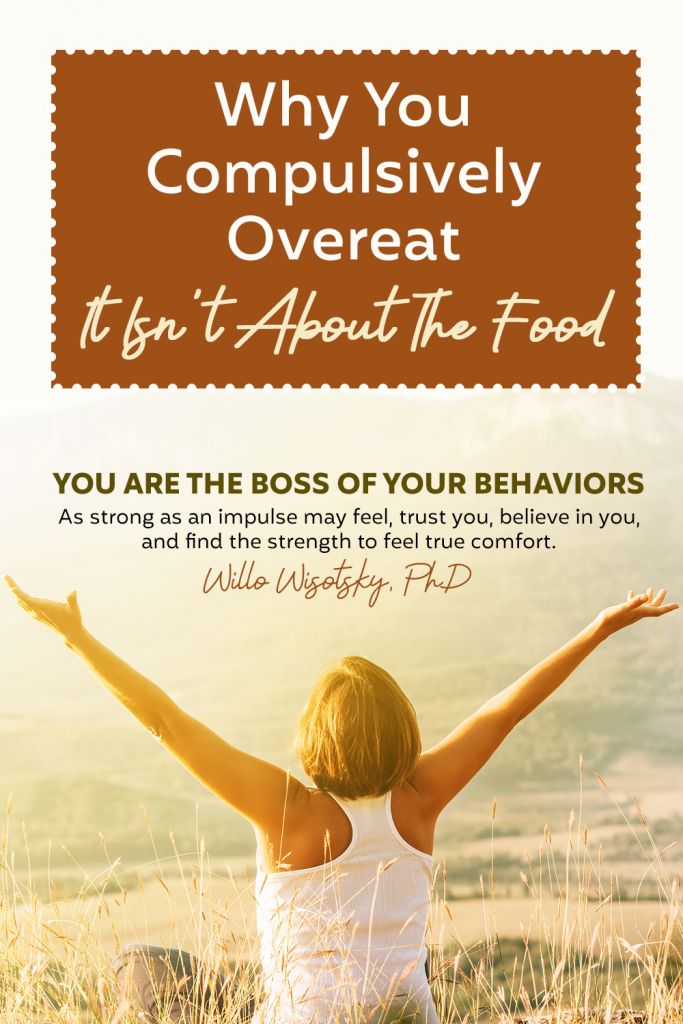
Why You Compulsively Overeat – It Isn’t About The Food
May 23, 2022Compulsive overeating can also be referred to as Binge Eating. Compulsively overeating is when we eat excessive amounts of food either in the context of hunger or outside of hunger and feel “out of control”, impulsive and unable to satiate. Binge Eating which has a similar profile, in which a person will eat unusually large amounts of food in a specific amount of time, feeling that eating is out of control, eating when not hungry, eating quickly during the binge, feeling shame or guilt about eating and frequent promises of ceasing such behavior and/or dieting.
Why Do We Compulsively Overeat?
Why do we compulsively overeat? Let’s first think about what compulsive overeating means to you emotionally. Are you physically hungry when you compulsively eat? Are you emotionally or situationally triggered? Are you able to find what you are “hungry “ for? Can you feel satiety physically and emotionally?
When we compulsively overeat and it isn’t about the food, it’s because we are looking for something else and I’m not referring to a different food or snack item.
Questions To Help You Identify the WHAT of Compulsively Overeating
First let’s try to identify the WHAT instead of the WHY so we can put distance between you and the impulse and/or habit. Ask yourself –
- Where am I? Name your location
- What time is it? Be specific
- What is going on? Try to answer this in a simplistic way
- What is my mood? Be specific- use just a few words
- What am I looking for? This is the tricky question- try to label it with a behavior
- Am I physically (in my belly) hungry? Put your hand by your belly
- What can I do differently than eating? Implement alternatives
When we first identify the “what”, we can start to explore the triggers for the compulsive behavior, because it typically is not hunger.
The questions above will afford you the opportunity to not only break the impulse, but create distance between you and the impulse, and also gain insight into the behavior.
Why You Compulsive Overeat and It’s Not About the Food
Let’s break down the questions and understand why it’s not about the food.
If your trigger is:
Location: “When I am in the kitchen after school, I am looking for a snack, but I am not hungry. I just need something because I am in the kitchen”.
Modify: Simply we can modify location triggers through simple awareness. Such as, after school, if I am in the kitchen, I will concentrate on the task at hand or address the actual need. If I feel like I need something, I will hydrate and understand the “need” through the ”what” questions. The need may be described by the desire to wind down, stay focused or desire to escape.
Time: It’s 3pm and I need something to get through the afternoon
Modify: We can modify time triggers by assuring we are properly hydrated and nourished with protein and fiber throughout the day. Ask yourself what you “need” and answer with an action such as a time out, fresh air, a distraction, communication, rest, completion of a task, or simply hydration.
Situation: “It was such a stressful day!”
Modify: Understand what is creating the stress, label it and ask yourself – what can I do differently to either address the stress of the day or wind down from the stress. This is the perfect time to not only label the stressor, but to establish stress busters, ways to release the stress, and ways to find comfort. Start with what has given you true comfort in the past or currently outside of food?
Mood: “I am so upset”, “I had the best day”, “I am overwhelmed”, “I’m nervous”, “it was a really rough day”.
Modify: Once the mood has been identified, ask yourself the “what” questions. Ask yourself what you need and what you are looking for outside of food (comfort, escape, celebration, symptom relief, a hug 😉 ). Ask yourself what you can do differently aside from eating.
Reidentify What True Comfort Feels Like
Emotional eating comes on quick and suddenly amidst the emotion, therefore creating distance between the emotion and action will aide you in eliminating the compulsion/habit of eating. We are all looking ultimately for comfort either through positive or negative emotions. Since food has been connected to comfort, it will take more work to reidentify what true comfort feels like.
Emotional hunger, head hunger, and comfort eating are all terms that identify that we are not physically hungry, but we are looking for or in need of something else to soothe or complement the emotion. True comfort doesn’t result in shame, frustration, disappointment, or sadness. True comfort results in the release of emotion, relaxation, and happiness.
You’re The Boss
Keep in mind that you are the boss of your behaviors. As strong as an impulse may feel, trust you, believe in you, and find the strength to feel true comfort. Choose your outcome-you deserve it!

 | ABOUT THE AUTHOR Dr. Willo Wisotsky is a NY State Licensed Psychologist and is affiliated with New York Bariatric Group. Dr. Wisotsky has committed her research and clinical practice to the field of eating disorders and obesity with its related medical and mental health comorbidities. Dr. Wisotsky practices from a Behavioral Medicine approach with an emphasis on improving overall well being, increasing mindfulness, motivation, quality of life and health.Read more articles from Dr. Wisotsky! |



